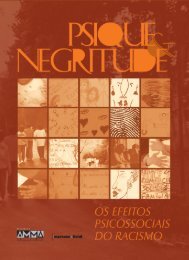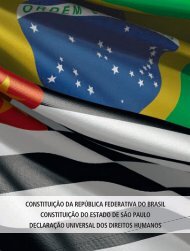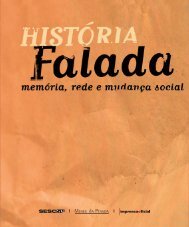CLÁSSICOS BRASILEIROS BRAZILIAN CLASSICS - Imprensa Oficial
CLÁSSICOS BRASILEIROS BRAZILIAN CLASSICS - Imprensa Oficial
CLÁSSICOS BRASILEIROS BRAZILIAN CLASSICS - Imprensa Oficial
Create successful ePaper yourself
Turn your PDF publications into a flip-book with our unique Google optimized e-Paper software.
Brazilian Classics<br />
A selection of authors with works in public domain<br />
84<br />
MANUEL ANTÔNIO DE ALMEIDA<br />
(1831 – 1861)<br />
Amid the mass of similar books produced at a<br />
given time, there sooner or later appear a few<br />
nonconformist works that outstand because<br />
of their distinctive quality. Springing up on<br />
the periphery of what is regarded as the most<br />
preponderant, these texts are heading for a<br />
future time that, recognizing their value, starts<br />
to harbor the innovations so established. That<br />
is precisely the case of Memórias de um sargento<br />
de milícias (Memoirs of a militia sergeant). This<br />
novel, by reading against romanticism, starts<br />
the Brazilian urban literature by introducing a<br />
picaresque adventure that took place in the early<br />
19th century in Rio de Janeiro. Manuel Antônio<br />
de Almeida takes advantage of everything that is<br />
popular. His characters are beggars, blind men,<br />
soldiers, barbers, godmothers, shamans, bailiffs<br />
... all drawn directly from the typical vivacity of<br />
the average society of the time. Simultaneously,<br />
linguistic elements are used to match the<br />
specimens inhabiting the story, making use of<br />
an entire set of Brazilianisms, idioms, popular<br />
sayings, catch phrases, etc., besides a wide<br />
repertoire of songs, dances, and habits peculiar<br />
to the local people on the eve of Independence.<br />
Review<br />
Main works<br />
Memórias de um sargento de milícias (1855); Dois amores (1861).<br />
Excerpt<br />
Memoirs of a militia sergeant<br />
In the vicinities of Cidade Nova's marsh lands,<br />
adjacent to a puddle, there used to stand a<br />
thatched house of the ugliest appearance, whose<br />
dirty façade and muddy front indicated thot<br />
inside it cleanliness was not to be expected. The<br />
house consisted of a small living-room and a<br />
bedroom; the furniture comprised two or three<br />
wooden seats, a few mats lying in a comer of the<br />
room, and a huge multipurpose wooden chest;<br />
it served as a dining table, bed, wardrobe, ond<br />
shelf. The house, almost always unoccupied,<br />
was locked most of the time, which gave it on<br />
atmosphere of mystery. This ominous home was<br />
inhabited by a character marked off by the most<br />
detestable mold; he was on old mestizo, with<br />
o wretched and filthy face, and covered with<br />
rags. However, for the reader's astonishment, it<br />
is to be said that that man's occupation was to<br />
provide fortune!<br />
Original and extraordinary<br />
"In 1852, pressed by his work as journalist in search of stories, forced by the demands of a periodic publication, however<br />
nimbly mastering those conditions, Manuel Antônio de Almeida began publishing his Memórias de um sargento de milicias<br />
on Correio Mercantil in the format of a weekly serial. This serial would later constitute one of the most interesting novels,<br />
one of the most original and extraordinary productions of the American fiction."<br />
(Mário de Andrade, "Memórias de um sargento de milícias")<br />
Ahead of his time<br />
"It is original, differently from any of the other books concurrently published or even shortly later, because it had been<br />
worked out and executed without any imitation or influence from any of the school or literary current that had driven<br />
our literature; [ ... ]. In the middle of the Romanticism wave, here Manuel de Almeida's novel, although overexcessively<br />
idealistic, romantic, and also excessively sentimental, is perlectly realist, even naturalistic, preceding for a long time the<br />
appearance, even in Europe, of those literary doctrines that received such names."<br />
(José Veríssimo, História da literatura brasileira)









